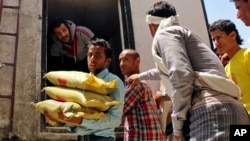The U.N. Office of the High Commissioner for Human Rights said Tuesday that May 4-10 was the deadliest period in Yemen since Saudi Arabia began airstrikes against Houthi rebels on March 26.
At least 182 civilians were killed during that six-day stretch, pushing the civilian death toll since the start of the air campaign to 828, with more than 1,500 wounded.
The World Health Organization gives a more complete death toll of at least 1,400 people killed and nearly 6,000 wounded. Because of the fighting and import restrictions on fuel, food and other relief supplies, millions of people in Yemen have received little or no lifesaving aid.
If the negotiated five-day humanitarian pause holds, critical aid will be transported and distributed to those in great need. The U.N. refugee agency has already sent a shipment of aid by sea, containing blankets, sleeping mats and kitchen utensils.
UNHCR spokesman Adrian Edwards said it was urgent for aid to reach many more people. He said his agency was making final preparations for a huge airlift of humanitarian aid.
“The plan for the airlift is for three flights carrying aid from our stockpiles in Dubai," he said. "These will bring 300 tons of sleeping mats, blankets, kitchen sets and plastic sheeting. This is part of a larger aid mobilization under way for a quarter of a million people.”
The WHO has 11 tons of medical kits and other supplies in warehouses in Yemen and says it will be able to distribute them when the guns fall silent. In addition, the WHO plans to fly in a 30-ton shipment, including emergency health kits, surgical supply kits, diarrheal disease kits, and water and sanitation supplies. WHO spokesman Tarik Jasarevic warned that the health situation in the country was dreadful.
“Power cuts and fuel shortages are making the work of hospitals very difficult in both public and private sectors," Jasarevic said. "And some of them have started to shut down some of their departments, especially operation rooms and intensive care units, in order to reduce consumption of fuel.”
World Food Program spokeswoman Elizabeth Byrs said WFP was ready to provide emergency rations to more than 750,000 people in conflict-hit areas of Yemen.
“During the pause, WFP will also pre-position special food products for 25,000 children under 5 and pregnant and nursing women," she said. "Child malnutrition rates in Yemen are among the highest in the world. Around half of all children under 5 are stunted — too short for their age — as a result of malnutrition.”
Despite the lack of security, Byrs said, aid workers have managed to reach more than 1 million people in the past month in eight of the country's 21 governorates. She said the conflict had increased the number of hungry people, with an estimated 12 million struggling to find their next meal.

